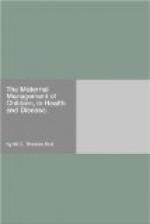3. Artificial, feeding, or bringing up by hand.
Extreme delicacy of constitution, diseased condition of the frame, defective secretion of milk, and other causes, may forbid the mother suckling her child; and unless she can perform this office with safety to herself, and benefit to her infant, she ought not to attempt it. In this case a young and healthy wet-nurse is the best substitute; but even this resource is not always attainable. Under these circumstances, the child must be brought up on an artificial diet “by hand,”—as it is popularly called.
To accomplish this with success requires the most careful attention on the part of the parent, and at all times is attended with risk to the life of the child; for although some children, thus reared, live and have sound health, these are exceptions to the general rule, artificial feeding being in most instances unsuccessful.
THE KIND OF ARTIFICIAL FOOD BEFORE THE SIXTH MONTH.
It should be as like the breast-milk as possible. This is obtained by a mixture of cow’s milk, water, and sugar, in the following proportions:—
Fresh cow’s milk, two thirds;
Boiling water, or thin barley water, one third;
Loaf sugar, a sufficient quantity to sweeten.
This is the best diet that can be used for the first six months, after which some farinaceous food may be combined.
In early infancy, mothers are too much in the habit of giving thick gruel, panada, biscuit-powder, and such matters, thinking that a diet of a lighter kind will not nourish. This is a mistake; for these preparations are much too solid; they overload the stomach, and cause indigestion, flatulence, and griping. These create a necessity for purgative medicines and carminatives, which again weaken digestion, and, by unnatural irritation, perpetuate the evils which render them necessary. Thus many infants are kept in a continual round of repletion, indigestion, and purging, with the administration of cordials and narcotics, who, if their diet were in quantity and quality suited to their digestive powers, would need no aid from physic or physicians.
In preparing this diet, it is highly important to obtain pure milk, not previously skimmed, or mixed with water; and in warm weather just taken from the cow. It should not be mixed with the water or sugar until wanted, and not more made than will be taken by the child at the time, for it must be prepared fresh at every meal. It is best not to heat the milk over the fire, but let the water be in a boiling state when mixed with it, and thus given to the infant tepid or lukewarm.
As the infant advances in age, the proportion of milk may be gradually increased; this is necessary after the second month, when three parts of milk to one of water may be allowed. But there must be no change in the kind of diet if the health of the child is good, and its appearance perceptibly improving. Nothing is more absurd than the notion, that in early life children require a variety of food; only one kind of food is prepared by nature, and it is impossible to transgress this law without marked injury.




